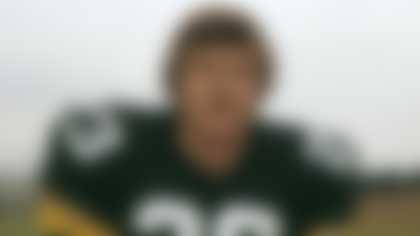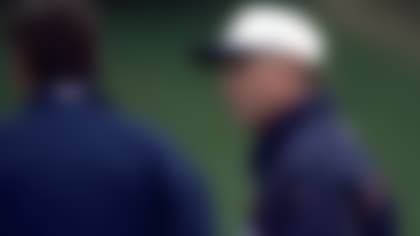CANTON, Ohio -- Slipping into a glass-enclosed hotel elevator after buying a Sunday paper on an early December morning in Atlanta, I looked up at the only other passenger -- a 6-foot-5, 240-pound business acquaintance in a nondescript, grey sweatsuit -- and offered a thin smile.
While the doors slid to a close behind me, I received a daunting death-stare from Charles Haley, the San Francisco 49ers' Pro Bowl pass rusher, who, a few hours later, would face the Atlanta Falcons at Fulton County Stadium. As a rookie beat writer, I'd already clashed with the sometimes surly Haley on a few occasions, but we'd seemed to be in a good place as the Niners began closing in on a second consecutive Super Bowl title.
Now we were headed up a see-through structure in the middle of the Marriott Marquis, and Haley was glaring at me like he wanted to send me on an express trip to the atrium.
"What is that, your 'game face?' " I asked, trying to diffuse the tension.
Haley kept his scowl, finally barking, "It's the only face you're gonna see for the rest of the season."
Looking back at that scene from 1989, I'm not sure if the elevator blessedly stopped at my floor or if I panicked and pushed a random button to expedite my exit. All I remember is that Haley totally freaked me out, which likely had been his primary objective.
Haley, who on Saturday will take his rightful place in the gridiron stratosphere by securing his long-awaited enshrinement in the Pro Football Hall of Fame, had an effective and organic way of keeping people off-balance, be they behemoth offensive tackles or neophyte journalists: Because his demeanor was so erratic and unpredictable, there was always a hint of fear.
"Charles was crazy," said Haley's former Niners teammate, Hall of Fame receiver Jerry Rice, as he prepared to board a connecting flight in Dallas on Thursday. "But he worked that to his advantage, in a big way."
Haley has come a long way in 26 years, making huge strides in terms of self-awareness, displaying maturity and reaching out to help others. Diagnosed with bipolar disorder a few years after his career ended, Haley has worked to help children struggling with mental illness. He has also attempted to mentor several NFL players, primarily for his two former teams, the San Francisco 49ers and Dallas Cowboys -- including talented pass rusher Aldon Smith, released Friday by the Niners after being arrested on hit-and-run and DUI charges.
Smith's struggle was one of many charged subjects addressed in serious tones by Haley on Friday, but the man hasn't completely lost his edge -- or his sense of humor. Asked by one reporter if there are any current NFL players who remind him of himself, Haley replied, "You know anybody that's crazy? That's me, then."
Though he certainly wasn't a conventional character, Haley played up his penchant for uneven behavior, using it as a weapon that added to his already imposing arsenal. Rangy, ferocious, fast and physical, Haley -- a fourth-round pick out of James Madison in coach Bill Walsh's famed 1986 Niners draft class -- was the linchpin of Niners defensive coordinator and eventual head coach George Seifert's cutting-edge defense, a combination outside linebacker/defensive end who served as the prototype for the emerging elephant position.
And he wasn't just a wild child relying on phenomenal talent. I learned early on, even while I was getting brutalized in locker-room interactions by Haley, that the dude was deceptively intelligent, and that you had to bring your 'A' game to even the most casual of conversations.
"First of all, he was one of the smartest players to play the game of football, and one of the guys who wanted to be great every time he stepped on the field," Ronnie Lott, the Hall of Fame defensive back who was Haley's mentor, said on Friday. "So yeah, we can talk about him being a little 'crazy.' My point is that he's crazy like a fox. His ability to outwit people with his mind, and his understanding of angles and schemes and ways of taking advantage of opponents, is all underappreciated. As you know, he's a lot smarter than the average bear."
Emotion, of course, played a huge role in Haley's career arc, one that saw him force his way out of San Francisco and, by landing in Dallas, help shift the NFL's balance of power at the start of the 1990s. By the time he was done, he'd won a record five Super Bowls, amassed 100.5 sacks and won a pair of NFC Defensive Player of the Year awards, among other gaudy achievements.
If the 49ers could have kept Haley happy, they might have been the team of the '80s and the '90s.
Early in the 1991 season, the Niners lost a game to the Raiders, 12-6, at the L.A. Coliseum, and Haley did not react well. San Francisco had parted ways with Lott following a last-second defeat to the New York Giants in the 1990 NFC Championship Game, exposing him to Plan B free agency and facilitating the great safety's move to the rival Raiders.
Inconsolable in the locker room after the game, Haley pulled an IV out of his arm, causing blood to spurt everywhere. A panicked Niners official raced to the Raiders' locker room and retrieved Lott from the shower. Lott, wearing only a towel, went in to calm his ex-teammate as stunned reporters looked on, open-mouthed.
A month later, the Niners went to Philadelphia and smothered the Eagles, 23-7, holding Philly to a paltry 235 yards. San Francisco forced five turnovers, including a pair of Jim McMahon interceptions, and registered six sacks, three by Haley.
Afterward, as I entered the visitors' locker room at Veterans Stadium, Haley was the first player I encountered. For all the times he'd blown off interviews since I'd known him, there were other occasions in which he absolutely wanted to talk -- and this, clearly, was one of them.
"(Expletive) George Seifert!" Haley intoned, proceeding to rip his head coach a new one. He explained the source of his anger: During the week, instead of having the Niners' defenders study game film of the Eagles' offense, Seifert had made them watch the Philly defense ... as if to say, this is what a real defense looks like.
"We've been one of the top defenses here," Haley snapped, "and I didn't appreciate that at all."
A few minutes later, a few other reporters and I surrounded Seifert, eager for his reaction. We told him what Haley had said.
"Did he?" Seifert asked, breaking out in a huge grin.
It was a win for Seifert, but it was only a temporary triumph. The next August, Haley decided he'd had enough, engaging in a flurry of lewd and disruptive behavior (including, most infamously, urinating on the car of teammate Tim Harris) and finally forcing a trade -- to the team that, in retrospect, was the worst possible partner for San Francisco.
"What I did wrong was, I held George responsible for Ronnie being (exposed to Plan B)," Haley said Friday. "Ronnie was my best friend. I couldn't let it go, and I had to get out because of it. That was wrong. I've already apologized to George for it. That's called 'growth,' right?"
Make no mistake: Haley, who'd help the Cowboys win three of the next four Super Bowls (with the Niners interrupting the streak in '94), remained irascible in Dallas. It was the defensive end's postgame, helmet-throwing tantrum that helped compel owner Jerry Jones to budge from his negotiating stance and end future Hall of Fame running back Emmitt Smith's holdout after two consecutive Cowboys defeats to start the '93 season, fueling a Super Bowl drive.
After ending his career following the '96 season, Haley -- who would later come out of retirement to play for the 49ers in the '98 postseason and stay on through the '99 campaign -- wrote an autobiography called "All the Rage". It opened with an eviscerating shredding of then-Dallas defensive coordinator Dave Campo, essentially calling him clueless (among other unflattering adjectives).
The following summer, I visited Cowboys training camp, and one of the first people I saw on the practice field was Haley, who'd signed on as a pass-rush assistant for the summer. I did a double take. A couple of hours later, I found Campo and said, "Wait, Charles is here? Isn't that a little awkward?"
Campo started laughing and explained: "The first day he got here, he came right to my office. He said, 'Coach, I was in a rage when I wrote that ... sorry, man.' What can I say? It's Charles. You can't stay mad at him."
"Been there," I replied.
Clearly, however, Haley's personality did not serve him well when it came to cultivating support for Canton. Credential-wise, he should not have had to wait a decade to get his bust molded, but it made sense that his candidacy didn't evoke warm and fuzzy feelings when assessed by some voters, intangible as that handicap might have been.
Said Lott: "The funny thing is, he had everything he needed. When we'd talk about it, he'd say, 'Look, I got all the credentials. What don't I have?' I think, unfortunately, it became about what he didn't have."
Or, as Haley told me at Thursday night's Gold Jacket Dinner, in his own, inimitable style: "I was getting tired of begging."
I wasn't the one who had to endure the wait, but from my vantage point, the delay worked out quite nicely. The Haley who'll be presented by former Niners owner Eddie DeBartolo (who, we can only hope, will finally get his gold jacket a year from now) is a calmer, wiser, more contemplative man, one who's exhibiting more outward appreciation for this weekend's festivities than any of his fellow inductees.
On Saturday, he'll talk about DeBartolo and Walsh and Seifert and Lott -- and, surely, many of their Cowboys counterparts -- and enunciate the gratitude he feels for having helped him evolve.
"There were a lot of great people that helped me get where I am," Haley said Friday. "It took a long time for me to look back and understand that, but I think it's time I give people their due. What made me is Bill Walsh and Mr. D, they taught me what family was. I didn't play well with others, and they had to teach me what team was."
In recent years, Haley has tried to do for Aldon Smith what Lott and others once did for him -- and the events of Thursday night and Friday were a huge setback. This made Haley emotional, at one point saying of Smith: "He's me. When I came in the league, I had a 10-year-old inside me screaming for help, but I didn't know how to ask for it. Instead of dealing with the problem, I ran from it ... I know now that I need to be there for these young guys."
Perhaps such altruistic mentorship will become an equally important part of Haley's legacy. In the meantime, there's an emotional speech to give on Saturday, and -- in keeping with tradition -- he'll inevitably have all of us on edge until he walks off that podium.
"Put it this way," said Rice, shaking his head and smiling. "I just hope he's on his best behavior."
Follow Michael Silver on Twitter @MikeSilver.




